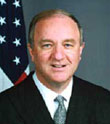Wall Street paused Thursday, with stocks little changed as strong profit reports from names like Apple Inc. and 3M Corp. failed to galvanize the market a day after the Dow Jones industrials crossed 13,000. Still, a modest advance in the Dow gave the blue chips another record close. Investors often tread water and reassess valuations after stocks push through technical or psychological barriers such as the Dow's ascent past 13,000 Wednesday. Beyond the Dow's move, investors were also keeping watch over the Standard & Poor's 500 index, which has in recent sessions crept closer to its high of 1,527.46, reached in March 2000. Better-than-expected profit news, which helped vault the Dow into record territory Wednesday and to a new trading high Thursday, continued but with less effect than in the previous session. Apple said its fiscal second-quarter profit rose 88 percent amid robust sales of iPods and Macintosh computers. Reports from Dow component 3M and automaker Ford Motor Co. also pleased investors. "Once you go through what people consider a milestone you are often going to have a little rest," said Ron Kiddoo, chief investment officer at Cozad Asset Management. "Earnings are lending support to the market. Obviously, there are some disappointments, but they're much above what people were expecting." The Dow rose 15.61, or 0.12 percent, to 13,105.50 after hitting a fresh trading high of 13,132.80. Thursday marked the Dow's 18th rise in the past 20 sessions and its 36th record close since the start of October. The gains Wednesday and Thursday left the Dow up more than 5 percent for the year. Broader indexes ended mixed Thursday. The Standard & Poor's 500 index slipped 1.17, or 0.08 percent, to 1,494.25, while the Nasdaq composite index rose 6.57, or 0.26 percent, to 2,554.46. Bonds fell amid the continuation of strong earnings reports. The yield on the 10-year note rose to 4.69 percent from 4.65 percent late Wednesday. The Dow swept past its latest milestone Wednesday amid better-than-expected earnings and economic data. But the question on investors' minds is whether upcoming data will prove the market's recent rally was justified, or overdone. While the economic calendar is busier next week, Kiddoo contends earnings will continue to drive stocks until midweek or so when investors begin to focus on the governments employment report, due to arrive May 4. So far, 22 of the 30 Dow components have reported earnings, with 16 of those reports topping expectations. Dow component Exxon Mobile Corp. released better-than-expected earnings Thursday; it rose 63 cents to $80.55. Microsoft Corp.'s fiscal third-quarter results, which the company announced after the closing bell Thursday, also came in ahead of expectations. Microsoft finished up 11 cents at $29.10 and rose in after-hours electronic trading. In other corporate news, Apple's profit report beat analysts' estimates, and the stock at times surpassed $100 a share. Apple closed up $3.49, or 3.7 percent, at $98.84. 3M, whose products include Scotch tape and coatings for flat-panel televisions, reported a stronger profit than Wall Street predicted, sending the stock up $3.48, or 4.5 percent, to $80.45. Ford, meanwhile, reported a narrower-than-expected loss for the first quarter. Ford rose 32 cents, or 4.1 percent, to $8.20. Wendy's International Inc. said late Wednesday it is considering a possible sale of the company, among other options. The burger chain rose $5.31, or 16.3 percent, to $37.99. Covansys Corp. rose $6.49, or 24.2 percent, to $33.29 after the provider of information-technology services agreed to be acquired by Computer Sciences Corp. for $1.3 billion. As is typical of companies announcing acquisitions, Computer Sciences slipped 14 cents to $55.83. Harman International Industries Inc., which makes audio equipment, agreed to be taken private in an $8 billion deal. The company, which also said its fiscal third-quarter profit rose 11 percent, jumped $19.94, or 19.4 percent, to $122.50. A light flow of economic news Thursday didn't appear to hold much sway over stocks. Among the reports, the Labor Department said applications for jobless benefits fell last week by 20,000, the biggest decrease in nearly two months. Federal Reserve banks in Chicago and Kansas City said manufacturing activity rose in their respective regions. Friday will bring more weighty data for investors, who are particularly interested in the Commerce Department's initial estimate of first-quarter gross domestic product. Gold fell on Thursday, while the dollar was mixed against other major currencies. Light sweet crude settled down 78 cents at $65.06 per barrel on the New York Mercantile Exchange. Declining issues outpaced advancers by about 9 to 7 on the New York Stock Exchange, where consolidated volume totaled 3.14 billion shares, compared with 3.17 billion traded Wednesday. Overseas, Japan's Nikkei stock average rose 1.12 percent. Britain's FTSE 100 closed up 0.12 percent, Germany's DAX index rose 0.60 percent, and France's CAC-40 ended down 0.05 percent.
|









